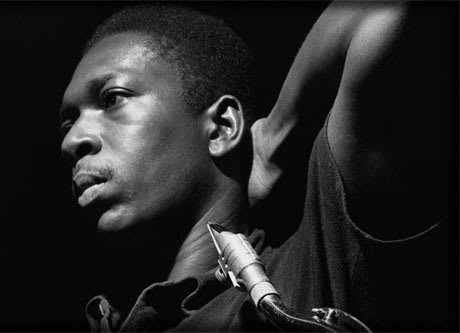Don Cheadle's long-gestating Miles Davis biopic is still forthcoming, and soon another classic jazz player will be getting the silver screen treatment: John Coltrane. The saxophonist will be examined with a documentary by director/writer/producer John Scheinfeld.
Scheinfeld has an history of making music docs, having been responsible for The U.S. vs. John Lennon (2006) and Who Is Harry Nilsson (and Why Is Everybody Talkin' About Him?) (2010). He also produced 2005's Beautiful Dreamer: Brian Wilson and the Story of "Smile".
This latest project evidently comes with the blessing of Coltrane's estate, since the sax man's son Ravi has served as a consultant. Rights to over 90 percent of his recorded music have already been secured, and the family is providing home movies and unreleased audio.
The film will apparently humanize the jazz great. Scheinfeld told Billboard, "He was an artist whose work resonated with fans from all walks of life — the architect Frank Gehry, Clint Eastwood, Bono, Philip Glass, Alicia Keys, Bill Clinton — and that fascinated me: What is it about this music that touches people so deeply?"
He continued, "Most of the books attempt to analyze his music. We'll make the film different by showing the impact the music made. He's like the Beatles in that he never repeated himself; he found what worked and moved on. He had a restless creativity, and that, to me, is quite admirable."
The film is slated to be finished by the end of 2015 and will hit the festival circuit in 2016, with a theatrical release sometime after that.
"The John Coltrane story is simple," Ravi said. "He worked his ass off, going to gigs and then coming home to practice. [Proffer and Scheinfled's] hearts are in the right place. They're film people, not jazz people, so I think it allows for a fresh take. What excites me is how this one artist affected so much outside the realm of music. It's about vision and discipline."
Born in 1926, Coltrane worked with the likes of Miles Davis and Thelonious Monk in the '50s before going on to become a band leader in the '60s. Starting in bebop, he became a pioneer in avant-garde jazz and died at the age of 40 from liver cancer.
Scheinfeld has an history of making music docs, having been responsible for The U.S. vs. John Lennon (2006) and Who Is Harry Nilsson (and Why Is Everybody Talkin' About Him?) (2010). He also produced 2005's Beautiful Dreamer: Brian Wilson and the Story of "Smile".
This latest project evidently comes with the blessing of Coltrane's estate, since the sax man's son Ravi has served as a consultant. Rights to over 90 percent of his recorded music have already been secured, and the family is providing home movies and unreleased audio.
The film will apparently humanize the jazz great. Scheinfeld told Billboard, "He was an artist whose work resonated with fans from all walks of life — the architect Frank Gehry, Clint Eastwood, Bono, Philip Glass, Alicia Keys, Bill Clinton — and that fascinated me: What is it about this music that touches people so deeply?"
He continued, "Most of the books attempt to analyze his music. We'll make the film different by showing the impact the music made. He's like the Beatles in that he never repeated himself; he found what worked and moved on. He had a restless creativity, and that, to me, is quite admirable."
The film is slated to be finished by the end of 2015 and will hit the festival circuit in 2016, with a theatrical release sometime after that.
"The John Coltrane story is simple," Ravi said. "He worked his ass off, going to gigs and then coming home to practice. [Proffer and Scheinfled's] hearts are in the right place. They're film people, not jazz people, so I think it allows for a fresh take. What excites me is how this one artist affected so much outside the realm of music. It's about vision and discipline."
Born in 1926, Coltrane worked with the likes of Miles Davis and Thelonious Monk in the '50s before going on to become a band leader in the '60s. Starting in bebop, he became a pioneer in avant-garde jazz and died at the age of 40 from liver cancer.
